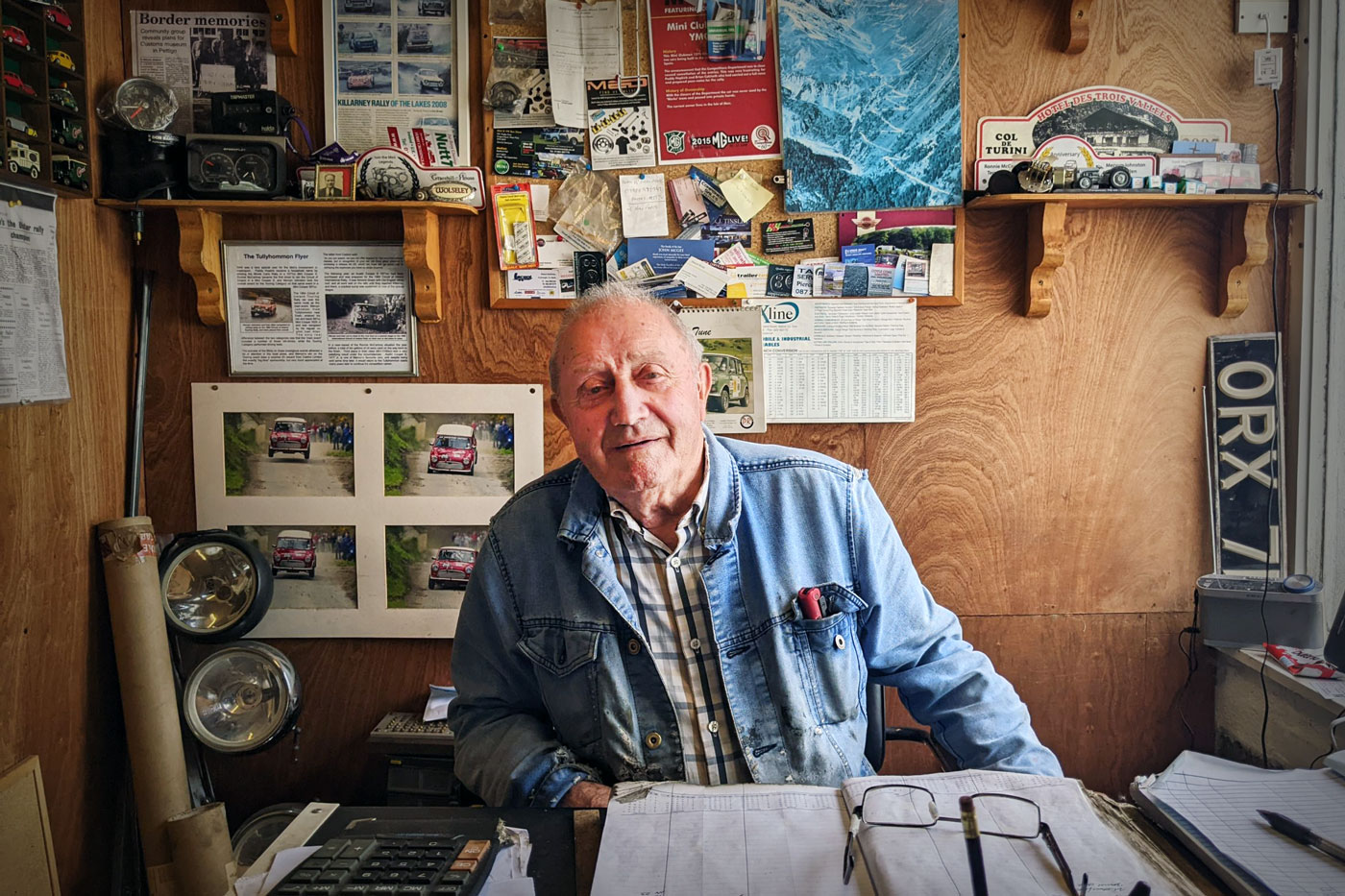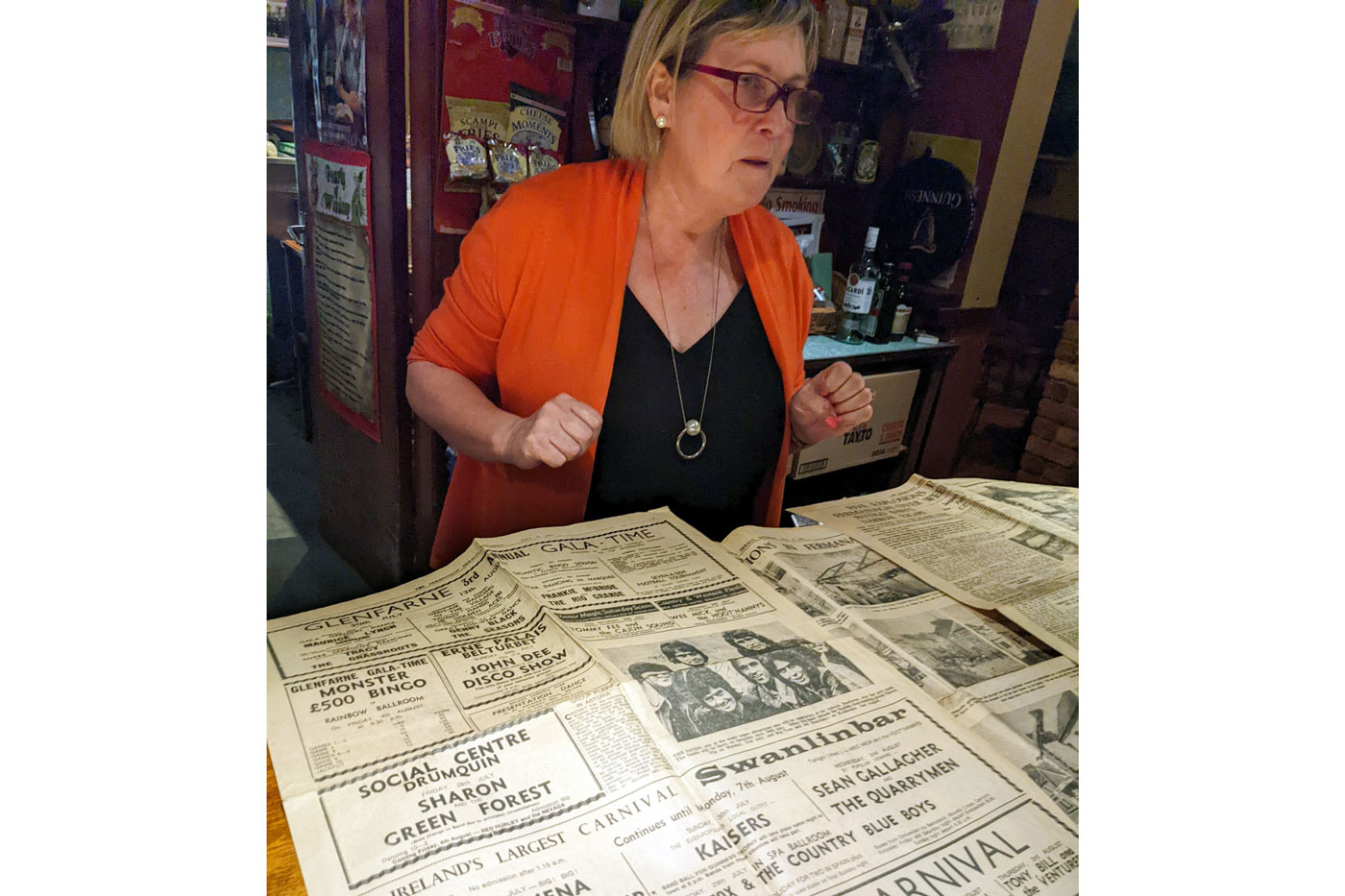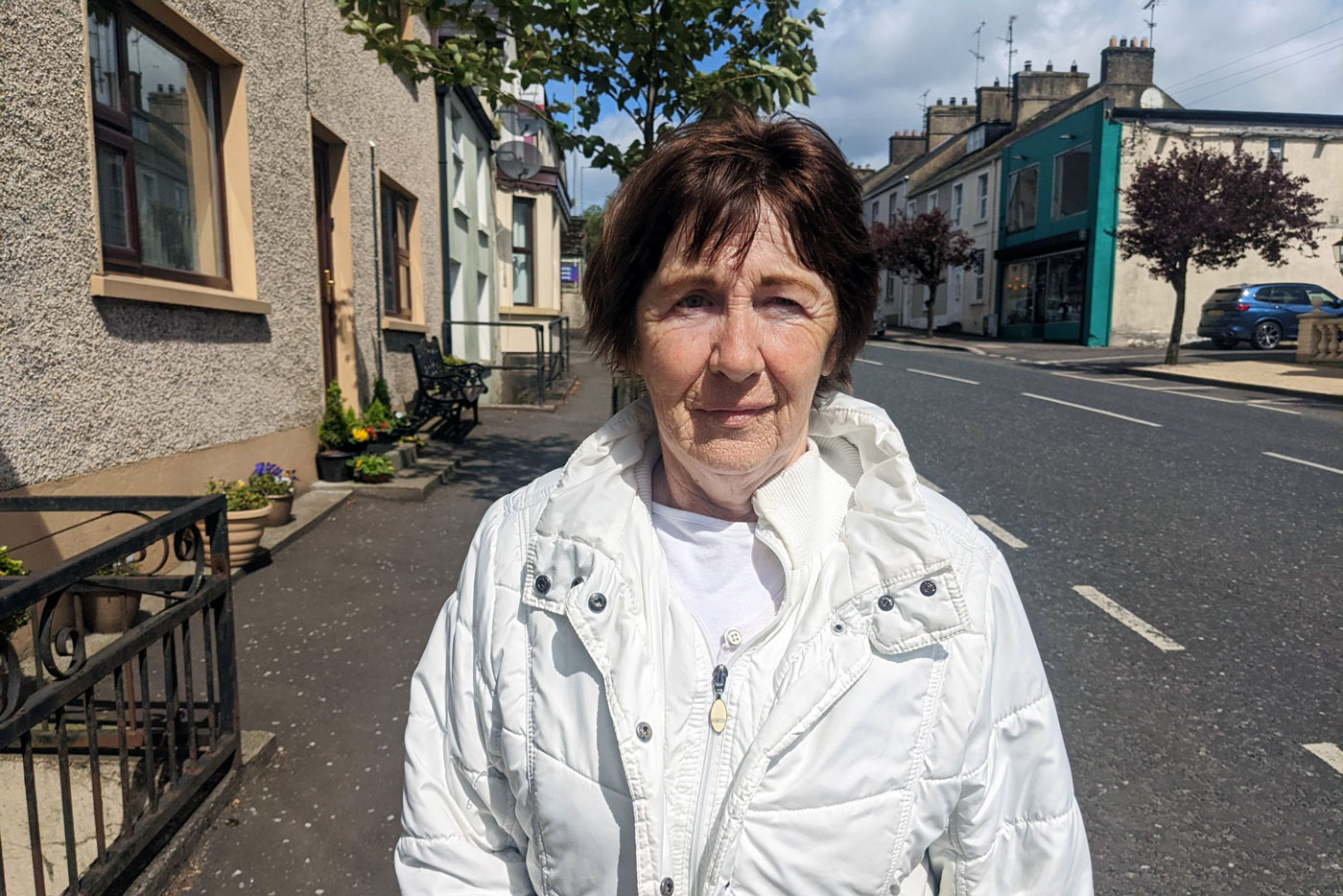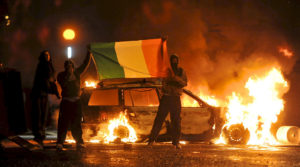“My cousin owns that pub,” Father Joseph McVeigh says as a yellow building comes into view. “I remember the day it was bombed — just five months before Michael was murdered.”
Michael Leonard, Joseph’s cousin, was shot dead by Royal Ulster Constabulary police officers on 17 May 1973. The day before we meet, 40 of Michael’s friends and family had gathered at the spot. Flowers were laid. A small cross was erected. There was wistful talk about a criminal investigation.
“That’s it just there,” Joseph says quietly, half-motioning for me to pull over. For the past 30 seconds he has been anxiously clenching and unclenching his fists. “Michael was alone when he died,” Joseph says. “His mother had sent him out from their home in Pettigo to fetch dinner from the shop on the other side of the border.”
Michael’s crime was to drive without a licence. The police later claimed he had refused to stop at a checkpoint that, it later turned out, didn’t exist. And so they pursued him until, 200 metres from the border, an officer leant out of his Land Rover and fired his gun. Michael was 24-years old. He was due to get married that summer. After that: a family and a career as a cattle dealer.

“Michael’s death was a tragedy,” Joseph says. “But it’s just one tragedy in hundreds. There are too many to be forgotten. Everyone here knows someone who was attacked.”
***
Carelessly sitting astride the Termon River, Pettigo remains shy about being the only village on the island of Ireland to be divided between the North and the Republic. There is no painted line on the two bridges that connect Counties Fermanagh and Donegal. There is no gift shop. Just a ramshackle Customs Post, its shamrock paint turned to rust, and a statue dedicated to the memory of the four young men who died “fighting against British forces in 1922”.
“Like rats in a trap!” was the verdict of one British newspaper after the Battle of Pettigo and Belleek. Pettigo had been partitioned for just over a year when the IRA moved in, a hundred years ago this week. The British responded with artillery shells, machine guns, trenches and bayonets; they recaptured Pettigo after 12 days. It was once again split in two, doomed to become a front in Ireland’s internal conflict — and a plaything for politicians who view a “hard border” as an acceptable means to end it. Today, you can buy an envelope with euros in the village shop on the Donegal side, cross the river, and post it with a stamp bought from the Post Office with sterling.
Mervyn Johnston’s garage is perched on the Fermanagh side of the river. It was a theatre for the IRA’s season of bombings in 1972. A former part-time soldier in the Ulster Defence Regiment, he was a walking target. Now 83, he knows he’s lucky to have survived. “We had two major bombs and three or four incendiaries,” he tells me. “Oh, and I’ve been shot at.”
Mervyn was sitting on the far side of the workshop when a man came to the door with a box, shouted that it was a bomb and demanded everyone leave. “I was having a cup of tea and thought it was all a joke. But then another chap came in with a gun and took us outside and lined us up against the wall.” The gunman started to ask for names. “Now, I had two lads working for me at the time who were also called Johnston, and I was second in the line and knew that if I gave a wrong name and these lads don’t, one of them is going to get shot.”

So Mervyn told the truth. “The next thing I know there’s a gun pressed to my forehead — a .45 revolver.” When the trigger was about to be pulled, Mervyn quickly ducked; the bullet missed him, ricocheted off the wall and hit one of his apprentices, though not fatally. “Before they could react, I ran off and they fired a few more shots after me. They’re just lucky I didn’t have a weapon on me.”
Did you have one nearby? “Oh yes. I went round and got my SMG [submachine gun] and fired a few rounds at them while they were driving off.” I ask him if, after all the attacks, he still feels the need to look over his shoulder. “The thing is, back then, there was never any problem here with the locals. The attackers came from a long distance away. Even after everything, I would still go across the river to have a drink in the pub.”
***
At Britton’s Bar that evening, Rangers are about to lose the Europa League final on penalties but no one is watching. We are talking about the explosions that pummelled Mervyn’s garage in 1972 when Triona Britton, the landlady, describes how she was almost killed during an attack that July. She disappears upstairs and reemerges clutching newspaper reports from the days after the attack. “Pettigo Baby Narrow Escape,” reads one headline. “I was fast asleep in my cot when the bomb exploded,” she explains. Slabs of concrete and slivers of steel from the car carrying the bomb fizzed through the air. “One piece of shrapnel ripped through the venetian blind and lodged itself in the wall right next to where I was sleeping,” Triona says.

Three men start to discuss their memories of 1972. “It’s a generational thing,” Frank, 39, says. “Speak to the older men and women, and their memories will be of the bombings. But it’s different for those of us who came after. They had the bombs; we didn’t. I was the first generation to be given the chance to go to an integrated school.”
Is this why younger people, more distanced from the horrors of 1972, are less concerned with the current debate over scrapping the Irish Protocol? “Many people here don’t care about the Protocol,” he replies. “There are more important things for them to worry about.”
***
To understand these worries, go to Belleek. A 20-minute drive away from Pettigo, the border village prides itself on the ceramics produced by its pottery: you can buy a hand-crafted ice bucket for £4,200. Seven weeks ago, a food bank opened.
“We were asked to come by the district council,” its organiser, John, tells me. “Things have definitely got worse in the past few months. The price of everything has gone up. The only thing that comes down is the rain.”
Northern Ireland, like the rest of the UK, is staggering through a cost-of-living crisis. But while Westminster, Holyrood, and the Senedd make a pretence of trying to fix theirs, Stormont remains silent. It’s been over a fortnight since Sinn Fein took control of the Northern Ireland Assembly. But what do they have to show for it? A handful of photos from victory night; a few half-hearted appeals for a border poll. And that’s it. Northern Ireland’s latest political revolution hasn’t even made it out of its wrapping paper.
With the DUP refusing to elect a Speaker to the national assembly until the Protocol is scrapped, the region faces months — perhaps even years — without a functioning executive. Until that changes, close to £500 million that could be spent on easing the ongoing crisis cannot be touched. In a county such as Fermanagh where the average wage is £23,000 — 12% lower than the average for Northern Ireland — that absence stings. This time last year, a quarter of children here were living in poverty. Nobody doubts that figure has increased.
“You look at our politicians and feel despair,” John says. “Hardworking people are being forced to go hungry, while their politicians don’t turn up to work and still take home their wage.” He tells me to head to Newtownbutler to see local poverty at its worst. “Since the start of April, we’ve had 18 different families start using the food bank there. And that number is only going to go up…”
***
On 19 August 2019, the Troubles returned to Newtownbutler. Police and soldiers patrolled the fields surrounding the village; surveillance aircraft hovered in the grey sky. A local newspaper had been tipped-off about a bomb being planted. The device was found and turned out to be a hoax, but a second explosive was hidden nearby. When it detonated, nobody was injured. Politicians in both Sinn Fein and the DUP condemned the attack. Then they looked away.
The Lanesbourough Arms Hotel, with its two-story bar, guards the crossroads at the centre of Newtownbutler. It opened in 1820 but now, like almost half the buildings slumped on either side, it is decomposing. Its windows have been smashed in; paint flakes off the walls. Peer through the broken glass and plates are still stacked neatly in the kitchen; an old telephone gathers dust on a shelf; a plastic Christmas tree is garlanded with baubles and dust. Nobody has pulled a pint there since 2004.

Maureen Murray shuffles past the Lanesborough whenever she can afford to buy food. “Everything is getting more expensive by the minute,” she says. “But what can we do? We’re all living on the breadline now. Everybody here worries about whether they’ll have enough food on the table next week.” Then she points to her walking stick: “I’m a bomb victim. I’ve always had to struggle.”
It was an October evening in 1972 when the car containing three men drove slowly into Annaghmore, on the border between Fermanagh and Monaghan. Maureen, then 21, looked on with her two siblings as one of the occupants threw a device through the village shop’s window. Unaware it was a bomb, Maureen and Raymond ran towards the building to make sure its owner hadn’t been injured. When the device exploded, Maureen was thrown into the air. Blinded in one eye and with a shattered leg, she has been unable to walk without a stick since. “My brother died by my feet,” she says. He was 24, the same age as Michael Leonard.
“I’m supposed to be receiving some extra money because I’m a bomb victim, but that doesn’t look like happening.” She explains how everything’s been held up by Stormont. “People are talking about that Protocol, but why does that matter if we’re struggling to feed ourselves? Everyone round here uses the food bank. It has become a fact of life.”
Around the corner, Elizabeth and Vincent have picked up their two-year-old daughter. She sleeps in her pram, oblivious to her parents’ anxiety. It is Thursday, and they are dreading the weekend: “By the time it comes, we often have nothing,” says Elizabeth. “It’s normal for us to have a fiver or tenner to spend between us and the three kids [aged between two and seven]. The foodbank is really helpful, but it doesn’t solve everything. When our kids ask for more food, we have to tell them to leave some for tomorrow or the next day.”

Vincent reels off the realities of inflation. “The prices of milk, nappies and wipes have gone up by 10p in no time,” he says. “Then there’s the price of fuel: it’s £1.79 for diesel over here. We can’t even afford to drive to the supermarket anymore.” Elizabeth stops rolling her pram back and forth. “The food, the petrol… Fucking everything is going up.”
And what if that doesn’t change? Silence. “I don’t want to think about it,” Elizabeth eventually says. “We’re just about keeping our heads above the water as it is.” Vincent grimaces. “Our politicians are doing fuck all at the moment to help us.”
In a region without a functioning government, where every politician seems to care more about a Protocol passed by accident than whether a family can feed itself, it’s hard not to conclude the same. In England, the politicians are useless. In Brussels, they’re intransigent. In Stormont, they don’t exist.
But this isn’t a story about the Protocol, or Brexit, or the prospect of a united Ireland. It is a story about politics — and what happens when it’s turned into a vacuum; when indifference becomes institutionalised and ordinary people are left to pick up the pieces. During the height of the Troubles, the authorities betrayed you by shooting you in the back as you drove down a country lane. Today, they just let you starve.
Disclaimer
Some of the posts we share are controversial and we do not necessarily agree with them in the whole extend. Sometimes we agree with the content or part of it but we do not agree with the narration or language. Nevertheless we find them somehow interesting, valuable and/or informative or we share them, because we strongly believe in freedom of speech, free press and journalism. We strongly encourage you to have a critical approach to all the content, do your own research and analysis to build your own opinion.
We would be glad to have your feedback.
Source: UnHerd Read the original article here: https://unherd.com


